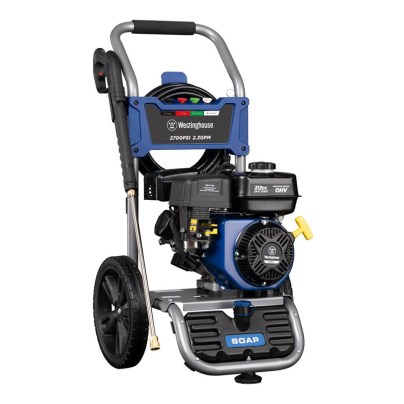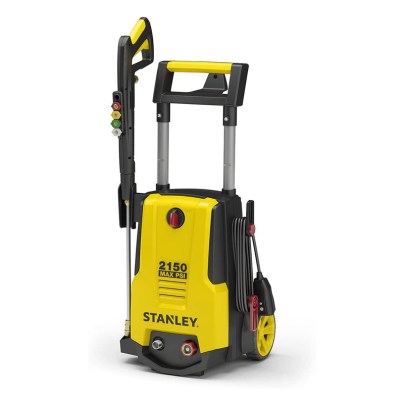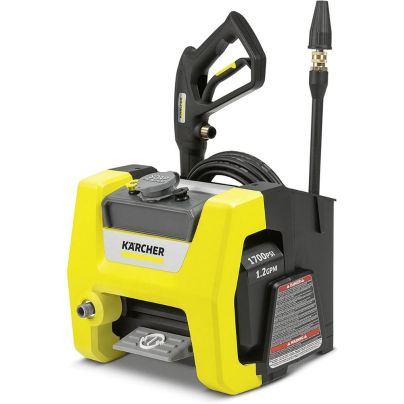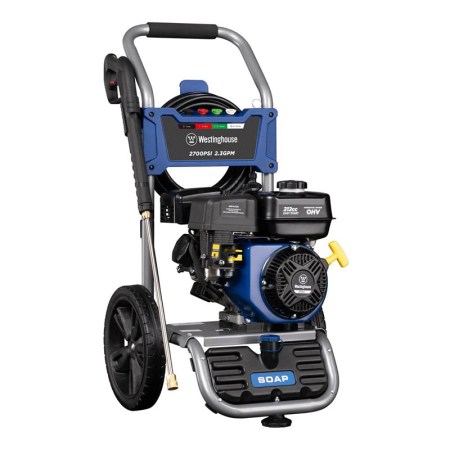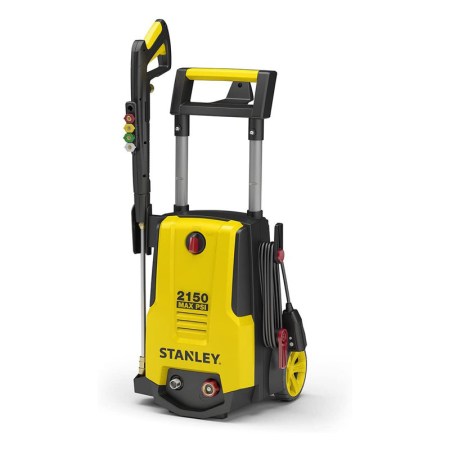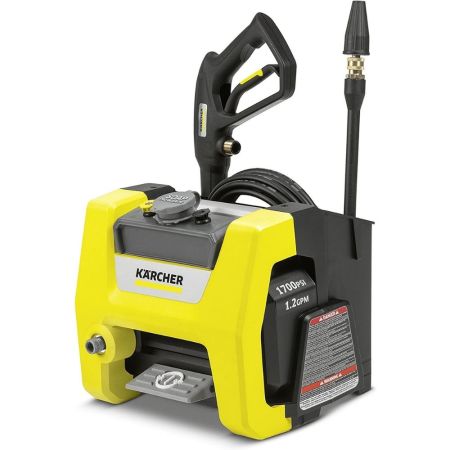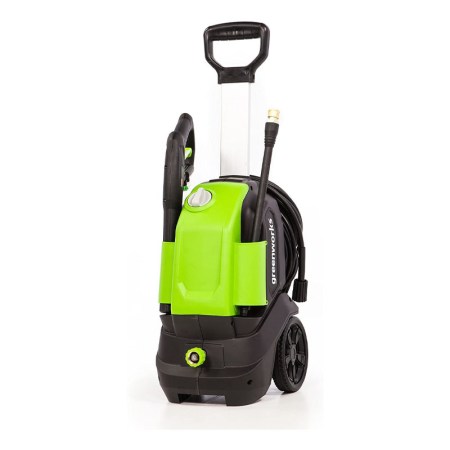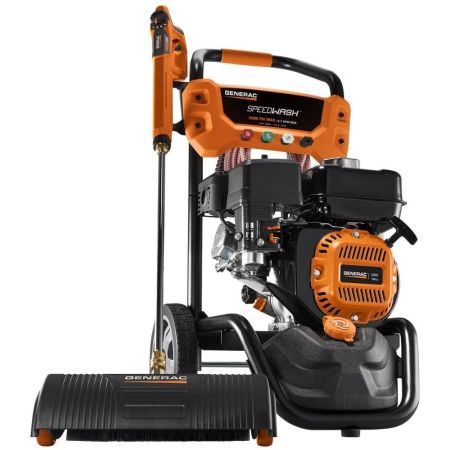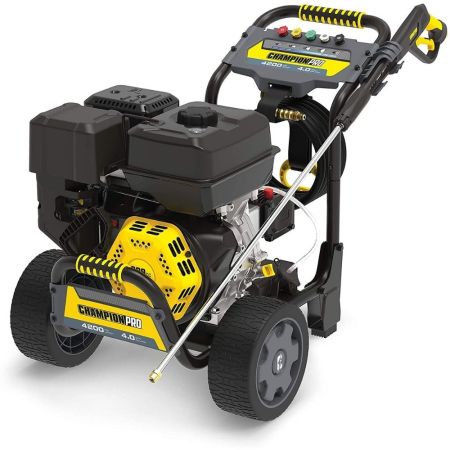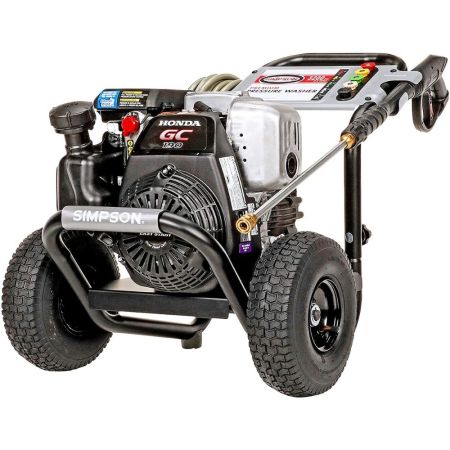We may earn revenue from the products available on this page and participate in affiliate programs. Learn More ›
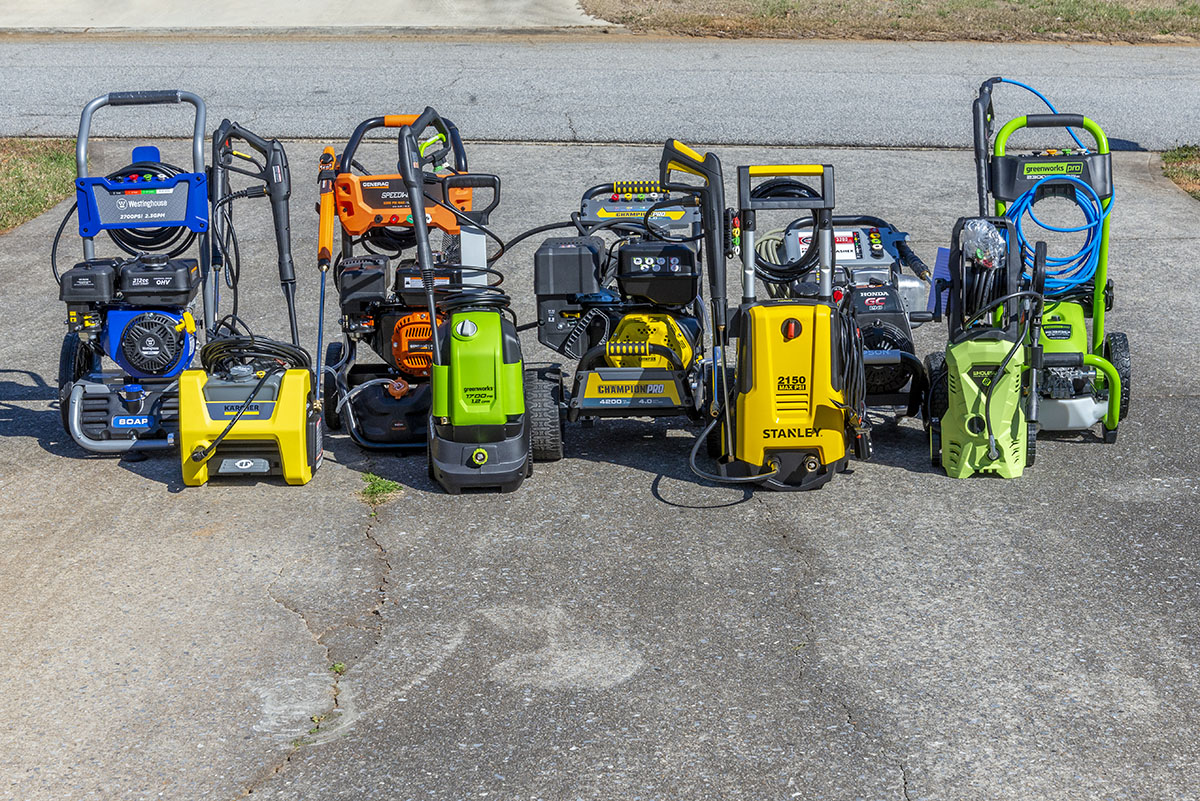
Nothing says “clean” like a thorough pressure-washing. Decks, driveways, patio furniture, and window shutters—they all collect dust, dirt, and an occasional bird dropping, growing grimier by the day. But a deep pressure-washing can spray away weeks, months, and even years of buildup.
Pressure washers are either powered by gas or electricity, and there are a variety of features and functions available, so it can be tough figuring out which tool is the right pick for your needs. To help, we tested and reviewed some of the best options on the market.
Read on for a breakdown of what you need to know while shopping for a pressure washer, including the types of pressure washers available and the cleaning power offered by each kind. Then, browse our detailed hands-on reviews, featuring some of the best pressure washer options on the market for cleanup tasks around the home.
- BEST OVERALL: Westinghouse WPX2700 Gas Pressure Washer
- BEST BANG FOR THE BUCK: Stanley SHP2150 Electric Pressure Washer
- BEST LIGHT-DUTY: Karcher K1700 Cube Electric Pressure Washer
- BEST MEDIUM-DUTY: Greenworks Cold Water Electric Pressure Washer
- BEST HEAVY-DUTY: Generac 7122 SpeedWash Pressure Washer
- BEST COMMERCIAL: Champion PRO Commercial Low Profile Pressure Washer
- BEST FOR CONCRETE: Simpson Cleaning MSH3125 MegaShot Gas Pressure Washer
ALSO TESTED:
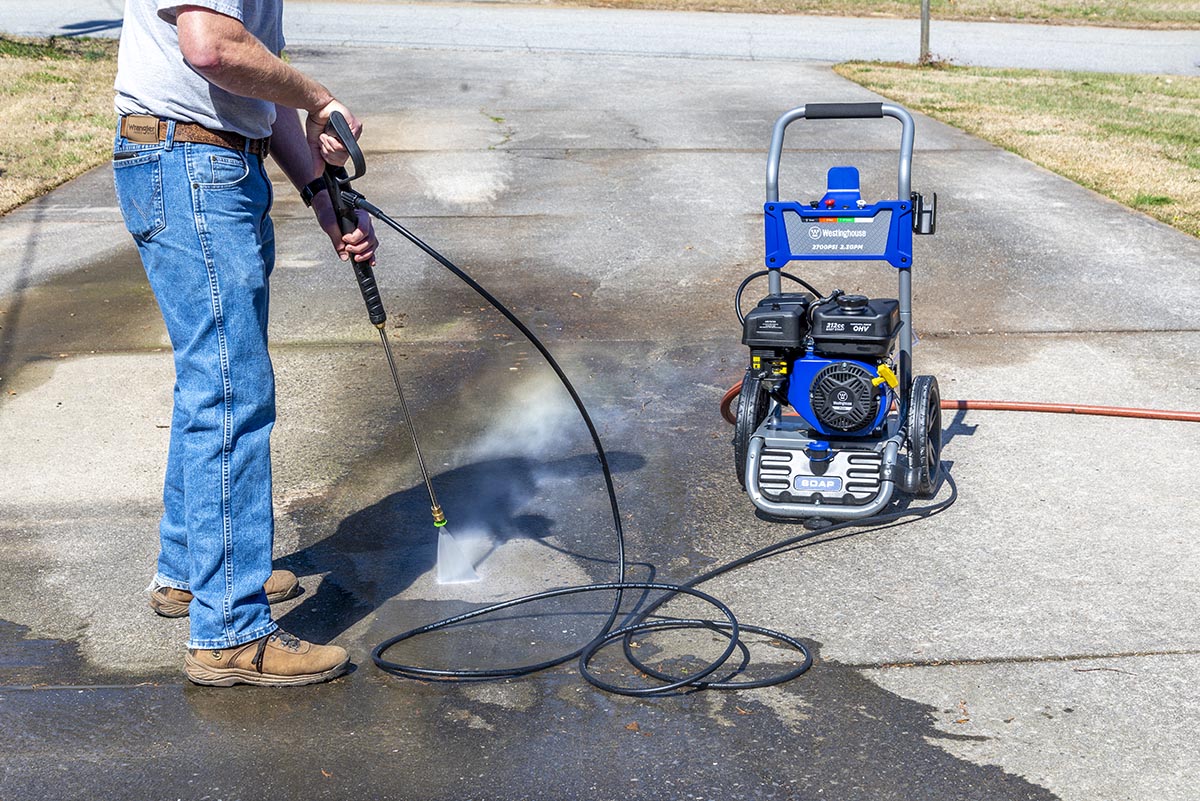
How We Tested the Best Pressure Washers
To gauge the capabilities of these pressure washers, we assembled a driveway test area. We marked off sections of concrete driveway for a timed cleaning comparison, then used each pressure washer and their various attachments to wash a mower, a car, or other machines to get a feel for maneuverability. Finally, we use them on house siding and windows to gauge their effective reach.
Our award picks came down to the differences in cleaning power, price, user comfort, and quality of construction. We learned a few valuable lessons. When psi is the same, an additional 1 GPM makes an enormous difference in terms of cleaning power; but an increase of 500 psi does not seem to make much difference when GPM is consistent. Pressure hose flexibility and maneuverability improve under pressure, but stiff hoses are awkward to set up and clean up. Also, bigger wheels are easier to roll over uneven surfaces than smaller ones, and pneumatic tires roll more smoothly than solid wheels.
Our Top Picks
With an array of electric and gas pressure washers on the market—all looking somewhat alike—it can be challenging to figure out which surface cleaner is the best. To sort things out, we’ve tested and reviewed some of the best pressure washers on the market that are most suited to DIYers. Just ahead, check out the results.
Best Overall
Westinghouse WPX2700 Gas Pressure Washer
See ItThe Westinghouse WPX2700 earned high marks in our field tests with its combination of cleaning power, maneuverability, relatively compact footprint, and competitive price. It also costs hundreds less than the next-best gas pressure washer we tested, and it delivered a nearly identical cleaning performance.
This gas-powered washer delivers ample water pressure for cleaning stains from the driveway, but not so much as to risk damaging a car’s paint job. It has strong water pressure, a good flow rate, and up to 2.3 GPM for 2,700 psi, so it is suitable for most tough outdoor cleaning chores, from washing mold stains off concrete on the highest setting to cleaning windows on the lowest setting. The large plastic wheels are less desirable than pneumatic tires for working “off road” but still offer decent mobility on uneven terrain.
The Westinghouse power washer includes four quick-connect nozzles and a 25-foot abrasion-resistant hose. Another positive: This pressure washer features a built-in detergent tank for easy cleaning and a 1-gallon-capacity gasoline tank. For users who want a dependable, powerful machine, the Westinghouse pressure washer does not disappoint.
Product Specs
- Gas vs. electric: Gas
- Axial vs. triplex: Axial
- Flow rate/pressure: 2,700 psi
- Attachments: 4 nozzle tips—0 degrees, 25 degrees, 40 degrees, and soap
Pros
- Built-in detergent tank makes cleaning easy
- 1-gallon gas tank large enough for most tasks
- Moves an impressive 2.3 GPM; ideal for most home cleaning
- 25-foot abrasion-resistant hose is durable and has a long reach
Cons
- Gas-powered washers aren’t eco-friendly compared to electric models
- Large and heavy; may be tricky to move and/or store
Get the Westinghouse pressure washer at Amazon or The Home Depot.
Best Bang for the Buck
Stanley SHP2150 Electric Pressure Washer
See ItThe Stanley SHP2150 was the best electric pressure washer we tested, offering an excellent bang for the buck. In our tests, it cleaned as well as the gas-powered pressure washers. The soft, flexible pressure hose was easy to maneuver during setup and cleanup, and it provided good reach while cleaning. The 6-inch wheels are a bit undersized for working on unpaved surfaces, but this is a good choice for a variety of driveway projects.
It pushes 1.4 GPM at up to 2,150 psi, which is great for all-purpose jobs like washing the car, deck, or sidewalk. The unit weighs just a little more than 25 pounds, making it a lightweight choice. It comes with a flexible 25-foot pressure hose, a 35-foot power cord, and a detergent bottle with a foam-spray nozzle. The kit also includes four quick-connect spray tips ranging from zero to 40 degrees.
Product Specs
- Gas vs. electric: Electric
- Axial vs. triplex: Axial
- Flow rate/pressure: 2,150 psi
- Attachments: 4 nozzle tips—0 degrees, 15 degrees, 25 degrees, 40 degrees, plus a foam cannon
Pros
- Kit includes 4 spray tips and a foam cannon; can tackle most jobs
- Flexible 25-foot pressure hose provides ample reach
- Compact design is ideal for portability and storage
Cons
- Molded trigger is less comfortable for extended use
- Transport handle is at an uncomfortably low height
Get the Stanley pressure washer at Amazon, The Home Depot, or Lowe’s.
Best Light-Duty
Karcher K1700 Cube Electric Pressure Washer
See ItFor quick and efficient cleaning of mildly dirty items—such as house windows, car exteriors, vinyl siding, and patio furniture—check out the Karcher K1700 Cube Electric Power Pressure Washer. The Karcher is a 1,700 psi electric pressure washer with a 1.2-GPM flow rate. Three quick-connect spray nozzles, an onboard detergent tank, and convenient on/off foot switch make it strong enough and versatile for tackling light-duty cleaning chores. The 20-foot power cord and 20-foot pressure hose offer plenty of reach for washing second story windows.
Considered one of the best electric pressure washer options available, this lightweight unit is built like a tool box, with a carry handle on top. In our tests, we liked the amount of cleaning power it offered for such a compact size. This would be an excellent choice for RVers and anyone who is light on storage space.
Product Specs
- Gas vs. electric: Electric
- Axial vs. triplex: Axial
- Flow rate/pressure: 1,700 psi
- Attachments: 3 nozzles—turbo, 15-degree all-purpose, and a detergent nozzle
Pros
- Compact size great for storage, while still providing good cleaning power
- Plenty of reach with a 20-foot electrical cord and a 20-foot high-pressure hose
- Affordable price point compared to similar options
Cons
- Lower PSI can take longer to clean heavy dirt
- Light-duty connection hardware may not stand up to frequent heavy use
Get the Karcher pressure washer at Amazon, The Home Depot, or Tractor Supply Co.
Best Medium-Duty
Greenworks Cold Water Electric Pressure Washer
See ItKeeping up with chores is easy with the Greenworks GPW1703. This electric pressure washer features a compact, vertical build for compact storage and large wheels for easy transportation. It delivers 1.2 GPM at 1,700 psi. The 25- and 40-degree spray tips with detergent bottle and the high-pressure soap applicator are designed to tackle the widest range of outdoor cleaning projects.
It performed well in all of our driveway tests, and it cleaned concrete at about one-third of the rate of the gas pressure washers. Plus, it maneuvered easily to clean all sides of small outdoor power equipment. The water pressure cleaned well but did not damage concrete, wood, or painted surfaces.
Product Specs
- Gas vs. electric: Electric
- Axial vs. triplex: Axial
- Flow rate/pressure: 1,700 psi
- Attachments: 25 and 40 degree spray tips, high-pressure soap nozzle, detergent bottle
Pros
- Durable construction in a compact size and upright build for easy storage
- Great at tackling tougher cleaning jobs around the yard such as driveways
- Pressure is gentle enough to clean wood or painted surfaces without damaging it
Cons
- Hose is stiff and cumbersome when not under pressure
- Lower flow rate cleans slowly for large jobs
Get the Greenworks pressure washer at Amazon, Lowe’s, or Walmart.
Best Heavy-Duty
Generac 7122 SpeedWash Pressure Washer
See ItTo wash dried, packed-on mud from driveways, users can benefit from the extra power of the Generac 7122 SpeedWash pressure washer. This gas-powered pressure washer features an easy-pull start cord and large never-flat wheels for transporting over rough terrain. The spray wand outputs water at up to 2.7 gallons per minute and features four adjustable power settings, in addition to four quick-connect spray nozzles.
We liked that the Generac also includes a power brush that attaches to the wand for extra scrubbing action. It made quick work of caked-on driveway crud. This was a better-than-average gas powered unit that started with a single pull of the cord, adjusted well to different cleaning tasks, and maneuvered smoothly on uneven ground. With the added features, it offers good value for the money.
Product Specs
- Gas vs. electric: Gas
- Axial vs. triplex: Axial
- Flow rate/pressure: 3,200 psi
- Attachments: 4 nozzle tips—0 degree, 25 degree, 40 degree, soap, and power brush surface cleaner
Pros
- Never-flat wheels provide great maneuverability even on uneven surfaces
- Moves an impressive 2.7 GPM; easily tackles any cleaning job
- Power brush surface cleaner attachment included; great for scrubbing
Cons
- Stiff pressure hose is cumbersome during setup and cleanup
- Big and heavy; could be difficult to maneuver for some users
Get the Generac pressure washer at The Home Depot.
Best Commercial
Champion PRO Commercial Low Profile Pressure Washer
See ItThose who need the extra power of a commercial-duty washer need look no further than the Champion Power Equipment Commercial Pressure Washer that’s ready to tackle even the most stubborn cleaning jobs. For blasting away rust stains on iron stairs or farm equipment, this bad boy delivers a hefty 4.0 GPM flow rate and delivers 4,200 psi of sheer water pressure.
The Champion gas-powered washer features oversize 10-inch tires and a 50-foot high-pressure hose. As the only pressure washer in the lineup with a triplex pump motor, it’s designed for long-lasting use. Buyers receive five quick-connect nozzles, a heavy-duty wand, and a trigger gun for use without the wand. The pressure washer also includes a built-in detergent tank for convenience.
In our tests, the Champion pressure washer moved an incredible amount of dirt to clean the driveway twice as fast as the next closest performer. It also pushed lots of water with enough power to clean second-story eaves without climbing a ladder. With its extra-long pressure hose, it also offers twice the range of the others. This is a great choice for tackling big jobs quickly. However, users should be aware that this much power can cause unintended damage to wooden or painted surfaces, chip concrete, or cause human injury.
Product Specs
- Gas vs. electric: Gas
- Axial vs. triplex: Triplex
- Flow rate/pressure: 4,200 psi
- Attachments: Quick-connect gun, wand, and 5 nozzles
Pros
- Commercial-duty washer moves a huge 4.0 GPM
- 10-inch tires and a 50-foot pressure hose can go almost anywhere
- Extra-long spray wand provides precise control even at a reach
Cons
- Added power makes this unit pricier to less powerful models
- Heavy machine and strong pressure kickback
- Risk of damage or injury due to high-pressure
Get the Champion Power Equipment pressure washer at Amazon or Tractor Supply Co.
Best for Concrete
Simpson Cleaning MSH3125 MegaShot Gas Pressure Washer
See ItConcrete driveways are notorious for collecting all manner of grease and antifreeze spills that seep into their porous surface. Removing tough stains on concrete takes a pressure washer that generates some real power, and the Simpson Cleaning MegaShot Gas Pressure Washer fits the bill. The MegaShot features a powerful 3,200-psi spray and delivers a generous 2.5-GPM flow rate for powering off even stubborn mud and stains.
The washer boasts oversize 10-inch wheels and a welded steel handle for maneuverability. Buyers receive five quick-connect nozzles that fit the washer’s wand, which is ergonomically designed for comfort and control. The MegaShot includes a 25-foot high-pressure hose. The 190-cc Honda gas engine on this pressure washer ran quieter, with better fuel efficiency, and equivalent “noticeable” power compared to the similarly sized gas models we tested. We also liked the Simpson MegaShot’s pneumatic tires for moving across rough, uneven ground. The compact size and low profile made it much easier to stow away than the bigger, bulkier gas units. The price is what kept it from earning the “Best Overall” award.
Product Specs
- Gas vs. electric: Gas
- Axial vs. triplex: Axial
- Flow rate/pressure: 3,200 psi
- Attachments: 5 quick-connect nozzles—0 degree, 15 degree, 25 degree, 40 degree, and a soap nozzle.
Pros
- 10-inch pneumatic tires and a welded steel handle are tough and durable
- Ergonomically designed wand; ideal for extended use without fatigue
- 25-foot high-pressure hose can move up to 2.5 GPM
Cons
- Pressure hose is stiff and somewhat cumbersome to maneuver
- Frame may be uncomfortably low for taller users
Get the Simpson Mega Shot pressure washer at Amazon or The Home Depot.
Also Tested:
Wholesun 3000PSI Electric Pressure Washer Machine
This Wholesun electric pressure washer did not meet our performance and quality standards when we tested it. Unfortunately, the stated water pressure and flow rates did not translate to the powerful cleaning performance we expected. Overall material and construction quality were also lacking.
Jump to Our Top Picks
What to Consider When Choosing the Best Pressure Washer
Both electric and gas pressure washers are a boon for taking the manual labor out of cleaning exterior surfaces, and both kinds clean in a similar manner. Still, several differences exist, such as how they operate; some models are electric-powered and others are gas-powered. It can be helpful to consider the following factors when searching for the best pressure washer.
Gas vs. Electric
For those who have large areas to clean, such as a pool deck, a patio, or tall exterior walls, the superior cleaning power of a gas pressure washer is the best bet. Gas washers provide the most mobility and power. They don’t tether the machine to an outlet, so users can move around more easily, plus gas washers have higher pressure to get the job done faster.
For smaller, simpler chores like cleaning outdoor furniture, the family car, or just a few feet of exterior space, electric pressure washers offer a few benefits. They’re generally quieter and lighter than their gas-powered counterparts.
While plug-ins don’t offer quite as much mobility, the best electric pressure washer options will typically include a 30-foot or longer cord, in addition to a long pressurized hose that can stretch the perimeter of the worksite. Be sure to keep the socket, plug, and your hands completely dry when connecting and disconnecting the cord.
Flow Rating and PSI
Another feature to consider is how many gallons per minute (GPM) a pressure washer expels. In consumer-grade power washers, the flow rating tends to run between 1.0 and 4.0 GPM. Commercial pressure washers range from about 2.0 to 10.0 GPM. Generally speaking, higher numbers result in faster, easier cleanups. So, for dealing with truly stubborn mud, crud, or gunk, let the force be with you and opt for a higher GPM.
While GPM determines the amount of flow through the washer nozzle, the pressure of the flow is rated in pounds per square inch (psi). In general, pressure washers generate an average of 1,000 to 4,000 psi of water pressure. Be aware, however, that a psi over 3,000 may damage some types of surfaces, such as softwood or siding.
Both ratings are important, although psi is used more for consumer model pressure washers, while GPM is usually more of a consideration when buying commercial models.
Intended Use
Pressure washers come in a variety of power settings, each of which is suitable for different tasks:
- Models rated below 2,000 pounds per square inch (psi) are considered light-duty and work best on smaller surfaces like patio furniture and cars.
- Pressure washers classified as medium-duty are rated between 2,000 and 2,800 psi. They offer a little more power and are an excellent option for larger cleaning jobs focused on smaller surfaces.
- Heavy-duty washers are rated from 2,900 to 3,300 psi and are suitable for large driveways, high walls, and exterior paint job preparation.
- At the top of the spectrum, professional-grade pressure washers top out at more than 3,300 psi. They’re most often used in commercial settings and have a steeper price.
- For a variety of cleaning jobs, consider a multi-duty model, which allows the user to adjust the pressure, tailoring it to the task at hand.
Attachments
Many pressure washers include a few attachments, and because the fittings are often universal on pressure washers, users can also pick up aftermarket attachments.
- Spray gun: This pistol-shaped handle features a squeeze trigger for delivering a blast of water.
- Lance or wand: This straight metal rod attaches to the spray gun and comes in various lengths.
- Nozzles: These tips control the pattern of spray. Some nozzles deliver a narrow stream, while others offer a wide fanned-out pattern. A foam nozzle incorporates air into the water stream to provide a foamy mix of soap and water.
- Detergent dispensers: If the washer doesn’t have a built-in detergent tank, users can connect a dispenser to deliver soap and detergent.
- Filter: An inline water filter connected to the hose traps hard water deposits that might shorten the useful life of the spray gun and nozzles.
Cleaning Performance
A pressure washer’s overall cleaning power is measured in cleaning units (CU). Not all manufacturers list a CU on their models, but it’s simple to figure out if the psi and the GPM are available.
To calculate a pressure washer’s CU, multiply the GPM by the psi. For example, if the washer has a GPM of 2.0 and a psi of 3,000, the machine will have a collective CU of 6,000. When comparing different pressure washers, if two have the same—or nearly the same—CU, yet the GPM and psi ratings are different, understand that the higher GPM will clean faster because it produces more water flow.
Axial vs. Triplex Pump
Gas-powered pressure washers feature two common types of pumps, each with its benefits and considerations.
- Axial: An axial pump is a direct-drive pump, which means the pump spins at the same speed as the engine. An axial pump offers good pressure and produces a lot of water power, but it tends to wear out sooner than a triplex pump. A washer with an axial pump is suitable for most DIY washing tasks.
- Triplex: Many commercial-quality pressure washers feature a triplex pump, which describes a heavy-duty displacement pump that works by expanding and contracting rather than spinning. A triplex pump will usually outlast an axial pump when both are used for the same duration, but expect to pay a premium for a washer with this type of pump.
Nozzle
Most pressure washers include more than one nozzle so the user can adjust the water spray pattern. The ¼-inch “quick connect” connections on these nozzles are standard, which means nearly any nozzle purchased for a pressure washer will fit another pressure washer.
The factor to consider, however, is the psi rating of the nozzles. Lower psi-rated nozzles are often a bit less expensive than higher psi-rated nozzles, depending on the quality. Still, a low-rated nozzle may not stand up under the pressure of a high-rated pressure washer, so make sure to use a nozzle with an equal or greater psi rating than the washer to which it’s attached.
Portability
Pressure washers, especially gas-powered models, can be hefty, weighing up to 55 pounds or more. They can be a chore to take out, put away, or load in the back of a pickup truck. If transporting the tool is essential, look for a compact, lightweight model; some weigh as little as 15 pounds and include attached carrying handles.
Most of the lighter-weight pressure washers are electric, and there’s a trade-off when choosing a more portable model because it won’t generate quite the CU as a heavy-duty, beefier unit. Still, with the design improvements in today’s electric pressure washers, they’ll do a decent job of tackling most around-the-house and car-washing tasks.
Additional Features
Most pressure washers don’t come with many bells and whistles, but a few options can make them simpler to operate.
- Built-in detergent tank: Some models feature an integrated tank instead of a dispenser that attaches to the wand, making it easy to fill the tank with detergent for washing tasks.
- Steel-braided hose: Reinforced with steel binding, these hoses are often found on commercial pressure washers but can be ordered separately to fit almost any washer. They’re less likely to bulge or leak.
- Upgraded wand: Like nozzles, pressure washer wands are rated for psi. Some washers include a wand rated for a higher psi, making them stronger and more likely to last longer.
Tips for Using a Pressure Washer
Using an electric or a gas pressure washer for your chores seems like a relatively straightforward task, but read all safety and usage instructions before operating one for the first time.
Features will vary by model, but in general, a few dos and don’ts and the following steps to use a pressure washer are the same.
- Connect a water hose.
- Fill a detergent tank or attach one if soap is desired.
- Attach a nozzle.
- Turn water pressure to the lowest setting.
- Start the washer’s engine or motor.
- Hold the spray gun with both hands and spray the surface.
- Start a minimum of 18 inches away from the surface—you can move closer later.
- Turn up the water pressure, if necessary.
FAQs
Pressure washers significantly speed up cleaning time, reducing or eliminating the need for manual scrubbing. For those new to the world of pressure-washing, some questions are to be expected. Below are answers to some of the most popular questions.
Q. What is a good psi rating for a pressure washer?
Pressure washers range between 1,000 and 4,000 psi. A machine will clean away light stains at the lower range, but heavy stains typically require a psi of 2,500 or higher.
Q. What is a good CU for a pressure washer?
A pressure washer with a cleaning unit (CU) rating (multiply psi by GPM) between 4,500 and 7,000 will handle most household cleaning jobs.
Q. Do gas pressure washers require oil?
Oil is necessary for lubricating a gas engine and helping it run smoothly.
Q. What kind of gas does a gas pressure washer use?
Most gas pressure washers use regular gas from a gas station, but most are not designed to use gas that contains more than 10 percent ethanol.
Q. Why does my electric pressure washer keep shutting off?
Electric pressure washers can tend to overheat, have a clog in the line, or have a more significant problem. Try turning off the machine, disconnecting the hose and wand, and then reconnecting and trying again. If that doesn’t help, contact the manufacturer.
Q. How do you winterize a pressure washer?
Flush the pressure hose from the washer and store it separately. Drain the gas tank or add a fuel stabilizer to the tank to keep the gas from separating and clogging the interior working parts over the winter.
Why Trust Bob Vila
Bob Vila has been America’s Handyman since 1979. As the host of beloved and groundbreaking TV series including “This Old House” and “Bob Vila’s Home Again,” he popularized and became synonymous with “do-it-yourself” home improvement.
Over the course of his decades-long career, Bob Vila has helped millions of people build, renovate, repair, and live better each day—a tradition that continues today with expert yet accessible home advice. The Bob Vila team distills need-to-know information into project tutorials, maintenance guides, tool 101s, and more. These home and garden experts then thoroughly research, vet, and recommend products that support homeowners, renters, DIYers, and professionals in their to-do lists.
